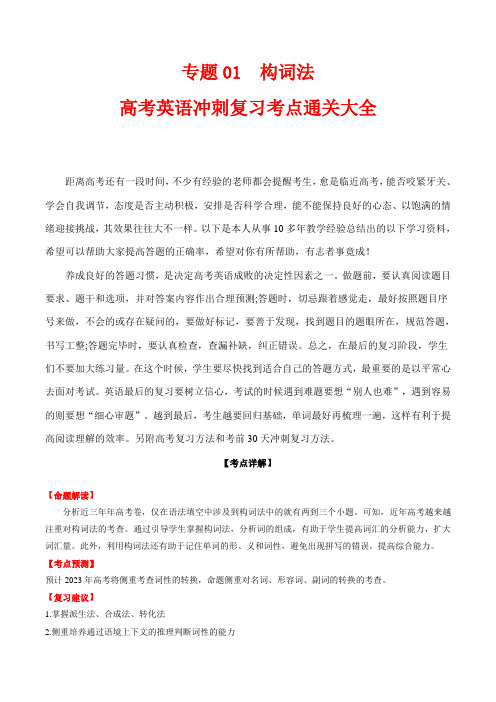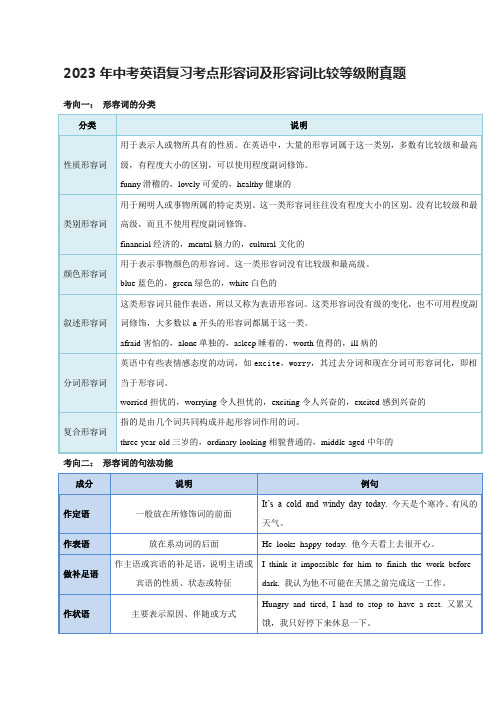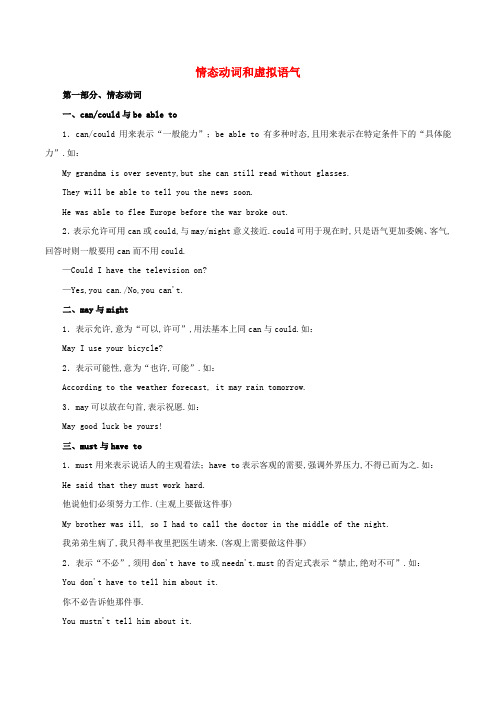考点复习:able
高考英语冲刺复习考点通关大全:专题01 构词法

专题01 构词法高考英语冲刺复习考点通关大全距离高考还有一段时间,不少有经验的老师都会提醒考生,愈是临近高考,能否咬紧牙关、学会自我调节,态度是否主动积极,安排是否科学合理,能不能保持良好的心态、以饱满的情绪迎接挑战,其效果往往大不一样。
以下是本人从事10多年教学经验总结出的以下学习资料,希望可以帮助大家提高答题的正确率,希望对你有所帮助,有志者事竟成!养成良好的答题习惯,是决定高考英语成败的决定性因素之一。
做题前,要认真阅读题目要求、题干和选项,并对答案内容作出合理预测;答题时,切忌跟着感觉走,最好按照题目序号来做,不会的或存在疑问的,要做好标记,要善于发现,找到题目的题眼所在,规范答题,书写工整;答题完毕时,要认真检查,查漏补缺,纠正错误。
总之,在最后的复习阶段,学生们不要加大练习量。
在这个时候,学生要尽快找到适合自己的答题方式,最重要的是以平常心去面对考试。
英语最后的复习要树立信心,考试的时候遇到难题要想“别人也难”,遇到容易的则要想“细心审题”。
越到最后,考生越要回归基础,单词最好再梳理一遍,这样有利于提高阅读理解的效率。
另附高考复习方法和考前30天冲刺复习方法。
【考点详解】【命题解读】分析近三年年高考卷,仅在语法填空中涉及到构词法中的就有两到三个小题。
可知,近年高考越来越注重对构词法的考查。
通过引导学生掌握构词法,分析词的组成,有助于学生提高词汇的分析能力,扩大词汇量。
此外,利用构词法还有助于记住单词的形、义和词性,避免出现拼写的错误,提高综合能力。
【考点预测】预计2023年高考将侧重考查词性的转换,命题侧重对名词、形容词、副词的转换的考查。
【复习建议】1.掌握派生法、合成法、转化法2.侧重培养通过语境上下文的推理判断词性的能力3.注重词汇积累考点一(派生法)派生法就是由一个词根加上前缀或后缀构成另一个词。
词根是派生词的基础,而词缀起到决定派生词的词汇意义和语法属性的作用。
(一)形容词的后缀和前缀1. 名词+-cial--形容词benefit--beneficial 有益的office--official 官方的face--facial 面部的race--racial 种族的finance--financial 金融的society--social 社会的【典例剖析】(2022全国卷乙卷) l provide ___________ (finance) aid and other benefits for local peoples.【答案】financial【解析】设空处后面有名词aid,充当provide的宾语,故修饰名词应当使用形容词作定语。
名校版英语语法考点解析 according as和according to区别

名校版英语语法考点解析according as和according to区别1. according as 根据,随……而定。
复合连词,引导从句。
如:Everyone contributes according as he is able. 每个人根据自己的能力作出贡献。
You will be praised or blamed according as your work is good or bad. 根据你工作的好坏,你会得到表扬或批评。
According as you are studying now, you won’t make much progress. 根据你现在学习情况来看,你不会有多大的进步。
The thermometer rises or falls according as the air is hot or cold.温度计(或寒暑表)根据空气的冷热而升降。
You will be praised or blamed according as your work is good or bad.你将被依据你工作的好坏而受到奖惩。
(也可译为:按照工作好坏实行奖惩。
)2. according to根据,按照。
复合介词,后接名词、代词、动名词等,如:Everything went off according to plan. 一切都按照计划实现了。
According to my watch it is five o’clock. 照我的表,现在是五点钟。
Each man will be paid according to his ability. 每个人将根据他的能力获得报酬。
注:according to 后一般不接view和opinion这类词,也不接表示第一人称的代词。
如:依我看,这部电影很不错。
正:In my opinion, the film is wonderful.误:According to my opinion, the film is wonderful.误:According to me, the film is wonderful.主语+vary between……and,表示:在……和……之间,(主语)是不同或不等(变化)。
八年级英语外研版下册(考点剖析+典题精讲)5

Module 5Problems初中英语考点剖析与典题精讲系列三点剖析单词·典句·考点able adj.能够【巧记提示】table(n.桌子)→able(adj.能干的)【经典例句】They were able to get away from the fire.他们能从大火中逃生。
【考点聚焦】1)派生词:ability n.能力;本领反义词:unable adj.不能的;不会的2)构成短语be able to相当于can,后面接动词原形,表示“能够”。
但是can只有现在和过去(could)两种时态,而be able to还可用于一般现在时态和将来时态。
beat v.打;打败【巧记提示】b+eat(v.吃)【经典例句】He beat all the other players and became the best one.他打败所有其他的队员,成为最棒的一个。
【考点聚焦】1)注意beat的过去式和过去分词分别是:beat; beat2)注意beat和win之间的区别:beat与win作“战胜;打败”讲时,主要区别反映在后面的宾语上。
beat后面的宾语应当是“人”,即比赛或是战斗的对手。
win后面的宾语是“物”即比赛;战斗;战争;奖金;金钱等。
shame n.惋惜的事;遗憾;羞耻【巧记提示】name(n.名字)→shame(n.羞愧)【经典例句】What a shame that it rained today.今天下雨了,真可惜。
【考点聚焦】1)构成句式:It’s a shame...表示“做……真遗憾/羞愧”,注意本句式后面只能接动词不定式或是that从句,不能接动名词。
2)shame构成以下短语:feel shame at...因……而感到羞愧;what a shame真遗憾bring shame on...是……丢脸;to one’s shame是某人感到羞耻的是……refuse v.拒绝;谢绝【经典例句】The big clock refused to welcome the New Y ear.这只大钟不愿迎接新年。
2023年中考英语复习考点形容词及形容词比较等级附真题

2023年中考英语复习考点形容词及形容词比较等级附真题考向一:形容词的分类考向二:形容词的句法功能试题1.(2022·上海·中考真题)These strawberries look _______. I ’d like to buy some for my father.A .happilyB .lovelyC .softlyD .properly2.(2022·辽宁阜新·中考真题)Most people don ’t like eating lemons because they taste ________.A .lovelyB .sweetC .deliciousD .sour 三、形容词比较级和最高级 1.变化规则2.不规则变化3.几种特殊情况(1)部分形容词有两种比较级和最高级形式:"as+形容调原级tas"的用法1.“甲+be as+形容词原级+us+乙"表示甲乙密程度相同.2.“甲+bet not +as/so+形容调原级+as+乙"表示“甲不如乙.I think maths is not so easy as PE.,我认为数学没有体育容易.3. 表示“甲是乙的……倍"时,用“甲+be+倍数+as+形容词原级+as+乙"结构(一倍:once;两倍:twice三倍及以上:数字+tims)。
Our school is three times as big as theirs.我们学校是他们学校的三倍大.4."half as+原级+as"表示“……是……的一半".Tom is half as tall as his father.汤姆的身高是他爸爸的一半。
5. as much/many...+as,表示"前后的数量相同John earns as much money as his brother.约输和他弟弟挣钱一样多,6."as+原级+as+用作比喻的名词”,此结构可形或许多惯用语,多用于口语。
备战2023年高考英语一轮复习(新高考专用)考点14-阅读之词义猜测题(解析版)

考点14 阅读之词义猜测(解析版)【命题趋势】词义猜测题型是高考中必考题型,每年考察1-2题。
所以词义猜测题型也是考生需要复习的考点。
词义猜测,即阅读中的完形填空。
可以通过前后句子中的关键词寻找相对应的词。
只要找到方法,拿下词义猜测轻而易举。
当然,着需要我们掌握足够的词汇量才能游刃有余!【重要考向】一、了解词义猜测题型的基本设题方式和基本提示词;二、掌握词义猜测解题技巧;考向一识别词义猜测题【典例】【2022年新高考全国卷Ⅰ阅读理解C篇】Wendy Wilson, extra care manager at 60 Penfold Street, one of the first to embark on the project, said: “Residents really welcome the idea of the project and the creative sessions. We are looking forward to the benefits and fun the project can bring to people here.”30. What do the underlined words “embark on” mean in paragraph 7?A. Improve.B. Oppose.C. Begin.D. Evaluate.【参考答案】词义猜测题。
根据文章倒数第二段“Residents really welcome the idea of the project and the creative sessions. We are looking forward to the benefits and fun the project can bring to people here. (居民们非常欢迎该项目的想法和创意会议。
我们期待这个项目能给这里的人们带来好处和乐趣)”以及划线处前的“one of the first (第一批人之一)”可知Wendy Wilson是着手这项工程的人之一,划线处的含义与C项:“Begin (开始)”含义相近。
高考英语语法情态动词考点汇总

二、need/dare 改错题:
1. A child who is under 10 years old needn’t a ticket. doesn’t need 2. I dare not to go out alone at night. I dare not go out alone at night. I don’t dare to go out alone at night. 3. Dared you to ask him the question yesterday? Dared you ask him the question yesterday?
used to 曾经,强调“今昔不同”。
He used to be a handsome boy.
This used to be a small city.
had better=had best “最好” had better (best) not do sth. 最好不做
You had better stay at home. You’d better not wake me up.
2. 表“允许”,意为“可以”。例如: Can I have another cup of tea? You can’t smoke here. 在疑问句中可以用could 表示更加委婉 的语气, 但回答时需用can。例如: -Could I ask you something, if you are not too busy? -Yes, you can.
1.表“义务”,意为“必须”
---Must we hand in our homework before supper? ---Yes, you must. /No, you needn’t/ don’t have to.
高考英语二轮复习情态动词和虚拟语气考点讲解含解析

情态动词和虚拟语气第一部分、情态动词一、can/could与be able to1.can/could用来表示“一般能力”;be able to有多种时态,且用来表示在特定条件下的“具体能力”.如:My grandma is over seventy,but she can still read without glasses.They will be able to tell you the news soon.He was able to flee Europe before the war broke out.2.表示允许可用can或could,与may/might意义接近.could可用于现在时,只是语气更加委婉、客气,回答时则一般要用can而不用could.—Could I have the television on?—Yes,you can./No,you can't.二、may与might1.表示允许,意为“可以,许可”,用法基本上同can与could.如:May I use your bicycle?2.表示可能性,意为“也许,可能”.如:According to the weather forecast, it may rain tomorrow.3.may可以放在句首,表示祝愿.如:May good luck be yours!三、must与have to1.must用来表示说话人的主观看法;have to表示客观的需要,强调外界压力,不得已而为之.如:He said that they must work hard.他说他们必须努力工作.(主观上要做这件事)My brother was ill, so I had to call the doctor in the middle of the night.我弟弟生病了,我只得半夜里把医生请来.(客观上需要做这件事)2.表示“不必”,须用don't have to或needn't.must的否定式表示“禁止,绝对不可”.如:You don't have to tell him about it.你不必告诉他那件事.You mustn't tell him about it.你绝不能告诉他那件事.—Must we do it now?我们必须现在做吗?—No, you needn't.不,你们不必.四、shall1.用于第一、第三人称的疑问句中,用来征求对方的意见或请求指示.如:What shall he do next?他下一步干什么呢?2.用于第二、第三人称的陈述句中,表示说话人的意愿,有“命令、警告、允诺、威胁、强制”等意思.如:He shall stay in bed.他必须躺在床上.You shall have it back next week.下周一定还你.He says he won't go, but I say he shall.他说他不去,但我说他必须去.五、will与would1.will用于各种人称,表示“意志、意愿”或“决心”等.如:If you will keep your watch half an hour slow, it is hardly surprising that you are late for your appointments.如果你想要让你的表慢半个小时,你约会时迟到就不足为怪了.2.will表示习惯性的动作,有“总是,惯于”的含义.如:An Englishman will usually show you the way in the street.英国人通常是会在街上给你指路的.3.would可表示过去反复发生的动作.如:On Sundays he would get up early and go fishing.星期天他总是早起去钓鱼.六、should与ought to1.should表示“建议”或“劝告”,有“应该”之意.如:You should learn from each other.2.ought to表示根据某种义务或必要“应当”做某事.如:Everyone ought to obey the traffic regulations.3.should和ought to也可用来表示推测,意为“想必会……”.如:—When can I come for the photos? I need them tomorrow afternoon.—They should be ready by 1200.七、情态动词表示推测1.can用于肯定句中表示客观的可能性,意为“有时会”;用于疑问句中可以表示推测,意为“可能”,有时表示一种惊讶的语气;用于否定句中也可以表示推测,can't意为“不可能”,语气很强烈.It is usually warm in my hometown in March, but it can be rather cold sometimes.我的家乡在三月份通常很暖和,但有时候也会相当冷.Mr. Bush is on time for everything. How can it be that he was late for the meeting?布什先生做什么事情都很准时,他怎么可能开会迟到呢?—Let's visit Tom together, Stephen.—There's no need to do so. He can't be at home, because I saw him board the flight to Beijing this morning.——Stephen,咱们一起拜访汤姆吧.——没必要这样做.他一定不在家,因为今天早晨我看见他登上了飞往北京的航班.2.may/might用于肯定句中可以用来表示不十分肯定的推测,意为“有可能”;用于否定句中也可以表示推测,may not意为“可能不”,表示一种不太确定的语气.The traffic is heavy these days. I might arrive a bit late, so could you save me a place?这些天交通很繁忙,我可能会来晚一点,请你帮我保留个位置好吗?3.must表示推测时只能用于肯定句中,意为“一定,必定”,表示十分肯定的语气(在疑问句中或否定句中要用can/could).—It's the office! So you must know eating is not allowed here.—Oh, sorry.——这是办公室!所以你一定知道这里不许吃东西.——噢,对不起.4.should用来表示推测时意为“应该”,即含有“按道理来说应当如此”的意思.There shouldn't be any difficulty about passing the road test since you have practiced a lotin the driving school.因为你在驾校训练了这么多,通过路考应该没什么困难.八、“情态动词+have done”结构1.should/ought to+have done,表示“过去本应该做而(实际)没有做的事情”,含有责备或遗憾的语气,意为“本应该……”.其否定形式为“should not/ought not to have+done”,表示某种行为本不该发生但实际上发生了.I shouldn't have watched that movie—it'll give me horrible dreams.我本不应该看那部电影——它会令我做噩梦.You ought to have come to the party yesterday, but why didn't you come?昨天你本来应该参加聚会的,可是你为什么不来?2.must+have done,用于肯定句,表示“过去一定做过某事”,表示一种很有把握的推测.注意,对过去发生的情况的否定推测常用“can't/couldn't+have done”表示.—Ye Shiwen won two gold medals in London Olympic Games.—She must have gone through tough training.——叶诗文在伦敦奥运会获得了两枚金牌.——她肯定受到严格的训练.—Do you know where David is? I couldn't find him anywhere.—Well. He can't have gone far—his coat's still here.——你知道大卫在哪里吗?我到处找不到他.——大卫的上衣还在这里,因此他肯定没走远.3.needn't+have done,表示“过去没有必要做某事,但实际上做了某事”.Mark needn't have hurried. After driving at top speed, he arrived half an hour early.马克本没必要那么匆忙.他以最快速度开车,结果早到了半个小时.4.may/might+have done,表示对过去情况的一种不太有把握的可能性的推测,表示“可能已做了某事……”,否定句表示“可能还没有……”.Sorry, I'm late. I might have turned off the alarm clock and gone back to sleep again.对不起,我迟到了.我可能把闹钟关掉后又睡着了.5.could+have done表示“过去本来可以做某事,但实际上没有做”;can/could+have done表示“过去可能做了某件事”.I could have saved the poor rabbit, but I didn't have the right drugs with me at that moment.我本来可以拯救那只可怜的兔子的,可是我当时没有合适的药品.第二部分、虚拟语气一、虚拟语气在虚拟条件句中的用法1.在具体运用中,条件从句中有时可省略if而采用倒装结构.如:Had it not been for your help, we wouldn't have achieved so much.2.介词without/but for、连词but、副词otherwise常用来表示某种假设条件.如:I wouldn't have made such rapid progress without your help.3.有时候从句动作和主句动作发生的时间不一致,这时谓语动词的形式要根据各自的时间来调整.如:If the weather had been more favourable, the crops would be growing still better.二、“should+动词原形”表示的虚拟语气这一类型常见词有“一坚持(insist)、二命令(order, command)、三建议(advise, suggest, propose)、四要求(request, require, demand, desire)”.以上词及其派生名词所接的名词性从句都使用“(should +)动词原形”的虚拟语气.①Jane's pale face suggested that she was ill, and her mother suggested that she(should) havea medical examination.简苍白的脸色表明她病了,她母亲建议她去检查身体.②She insisted that the man had stolen her car and that he(should) be sent to prison.她坚持说那个男人偷了她的车,并坚决要求他坐牢.三、特殊句式中的虚拟语气If only/It's (high) time (that)...wish/would rather/as if等固定句式要求用相应的虚拟语气表达形式.①I wish I could fly.真希望我能飞.②I would rather you came tomorrow.我宁愿你明天来.③If only I had taken your advice!要是听从了你的建议该多好啊!高频考点一、考查情态动词例1.(2018·北京卷)In today’s information age, the loss of data _________ cause serious problems for a company.A. needB. shouldC. canD. must【答案】C【解析】考查情态动词.句意:在今天的信息时代,数据的丢失有时会对一个公司造成严重的问题.数据丢失造成严重问题是客观上会发生的情况,即“客观可能性”,故该空应用情态动词can.C选项正确.其余情态动词均没有该用法.need需要;should应该,竟然;must必须,肯定.【变式探究】—Can’t you stay a little longer?—It’s getting late. I reall y _____go now, My daughter is home alone.A .mayB .canC . mustD .dare【答案】C【解析】句意:——你不能再多待会儿吗?——很晚了,我必须得走了.我女儿一个人在家.A. may可能,可以,也许;B. can能,会;C. must必须,必然要,必定会;D. dare敢,胆敢.结合句意,故选C.【变式探究】________ I have a word with you? It won’t take long.A. CanB. MustC. ShallD. Should【答案】A【解析】本题考察的是情态动词基本意义辨析.Can能够,可能;must必须,一定;非得;shall将要;should应该;句意:我可以和你谈谈吗?不会花很多时间的.根据句意可知本题使用can I…?表示询问对方是否允许.如:Can I use your dictionary?我可以使用你的字典吗?故A正确.高频考点二、考查情态动词的用法例2. (2018·天津卷) I can't find my purse. I___________ it in the supermarket yesterday, but I'm not sure.A. should leaveB. must have leftC. might leaveD. could have left【答案】D【解析】考查情态动词表推测.句意:我不能找到我的钱包了,昨天我有可能把它落到超市了,但我不确定.根据句中时间状语yesterday可知,是对过去事情的推测,故用情态动词+ have done,再根据后句but I’m not sure.可知,此推测为不能肯定的推测,故用情态动词could,表示“可能”.故选D.【变式探究】(2017•天津)My room is a mess, but I __________clean it before I go out tonight.I can do it in the morning.A. daren’tB. shouldn’tC. needn’tD. mustn’t【答案】C【解析】句意:我的房间很乱,但是在今晚我出去之前不需要打扫,我可以明天早晨再打扫.A.不敢;B.不应该;C不需要;D.不许.根据句意,故选C.【变式探究】Why didn't you tell me about your trouble last week?If you ________(tell)me,I could have helped.【答案】had told【解析】句意:上个星期你为什么不告诉我你的麻烦事?如果你告诉我了,我就能帮你.根据句意和相关信息判断,条件句表示与过去事实相反的假设,此时从句用过去完成时,主句谓语用“情态动词+have done”形式.【变式探究】I ______ have worried before I came to the new school, for my classmates here are very friendly to me.A. mightn’tB. mustn’tC. needn’tD. couldn’t【答案】C【解析】句意:我来新学校之前本没有必要担心,因为在这里我的同学对我非常友好.needn’t have done本没有必要做某事,表示实际上已经做了某事.根据句意可知选C.高频考点三、考查虚拟语气例3.(2019·天津卷)The workers were not better organized, otherwise they ________ the task in half the time.A.accomplished B.had accomplishedC.would accomplish D.would have accomplished【答案】D【解析】考查虚拟语气.句意:工人们没有被组织好,否则的话他们会用那一半的时间完成任务的.此处otherwise表达了一种含蓄虚拟;otherwise前的内容所述的是过去的事实,相当于if引导的条件状语从句“If the workers had been better organized”,因此后半部分应用“主语+would have done sth.”的结构.故选D.【举一反三】【2018·江苏】It’s strange that he _______have taken the books without the owner’s permission.A. wouldB. shouldC. couldD. might【答案】B【解析】考查虚拟语气.句意:真奇怪,他竟然没有主人的允许就拿走了这些书.在句型”It is important/necessary/strange/impossible/natural that...”中,其中由that引导的主语从句通常用“should+动词原形”这样的虚拟语气,其中的should可以省略.故选B.【变式探究】(2017·北京)If the new safety system _______ to use, the accident would never have happened.A. had been putB. were putC. should be putD. would be put【答案】A【解析】句意:如果这个新的安全系统被投入使用过的话,这个事故就不会发生了.根据主句确定是对过去情况的虚拟,所以从句谓语用had done形式,此外根据句意可知是被动,用被动语态,故A项是正确的.【变式探究】________(have)the governments and scientists not worked together,AIDSrelated deaths would not have fallen since their highest in 2005.【答案】Had【解析】句意:如果政府和科学家不共同努力,与艾滋病相关的死亡就不会从2005年的最高点下降.这是一个省略了从属连词if的虚拟语气句,使用了倒装句式.根据主句的would not have fallen可知,这里是表示过去的虚拟语气,所以用had.【变式探究】Without his wartime experiences, Hemingway____ his famous novel A Farewell to Arms.A.didn’t writeB. hadn’t writtenC. wouldn’t w riteD. wouldn’t have written【答案】D【解析】句意:没有他战时的经验,海明威就不可能写出著名的小说永别了武器.根据without his wartime experience没有战时的经历,可知表示对于过去的否定猜测,故主句用would have done,因此选D 项.1.(2019·天津卷)The workers were not better organized, otherwise they ________ the task in half the time.A.accomplished B.had accomplishedC.would accomplish D.would have accomplished【答案】D【解析】考查虚拟语气.句意:工人们没有被组织好,否则的话他们会用那一半的时间完成任务的.此处otherwise表达了一种含蓄虚拟;otherwise前的内容所述的是过去的事实,相当于if引导的条件状语从句“If the workers had been better organized”,因此后半部分应用“主语+would have done sth.”的结构.故选D.2.(2019·江苏卷)What a pity! You missed the sightseeing, or we ________ a good time together.A.had B.will haveC.would have had D.had had【答案】C【解析】考查虚拟语气.句意:多么遗憾!你错过了这次游览.否则,我们就可以一起度过一段愉快的时光.根据关键词or可知,这里表示与过去的事实相反,谓语动词应用would/could/should/might+have done.1.【2018·江苏】 There is a good social life in the village, and I wish I _______ a second chance to become more involved.A. hadB. will haveC. would have hadD. have had【答案】A【解析】考查虚拟语气.句意:在这个村里有很好的社交生活,并且我希望我再有机会去更多的参与.本题考查wish引导的宾语从句,表示与现在事实相反的愿望,所以从句用一般过去时.故选A.2.【2018·江苏】It’s strange that he _______have taken the books without the owner’s permission.A. wouldB. shouldC. couldD. might【答案】B【解析】考查虚拟语气.句意:真奇怪,他竟然没有主人的允许就拿走了这些书.在句型”It isimport ant/necessary/strange/impossible/natural that...”中,其中由that引导的主语从句通常用“should+动词原形”这样的虚拟语气,其中的should可以省略.故选B.3.(2018·天津卷) I can't find my purse. I___________ it in the supermarket yesterday, but I'm not sure.A. should leaveB. must have leftC. might leaveD. could have left【答案】D【解析】考查情态动词表推测.句意:我不能找到我的钱包了,昨天我有可能把它落到超市了,但我不确定.根据句中时间状语yesterday可知,是对过去事情的推测,故用情态动词+ have done,再根据后句but I’m not sure.可知,此推测为不能肯定的推测,故用情态动词could,表示“可能”.故选D.4.(2018·北京卷)In today’s information age, the loss of data _________ cause serious problems for a company.A. needB. shouldC. canD. must【答案】C【解析】考查情态动词.句意:在今天的信息时代,数据的丢失有时会对一个公司造成严重的问题.数据丢失造成严重问题是客观上会发生的情况,即“客观可能性”,故该空应用情态动词can.C选项正确.其余情态动词均没有该用法.need需要;should应该,竟然;must必须,肯定.5.(2018·北京卷)They might have found a better hotel if they _________ a few more kilometers.A. droveB. would driveC. were to driveD. had driven【答案】D【解析】考查虚拟语气.句意:如果他们多开几公里的话,他们也许会找到一个更好的旅馆.由“they might have found a better hotel”可知,该句是表示对过去的虚拟.if ____ a few more kilometers是条件句部分,表示对过去的虚拟,条件句部分要用过去完成时态,故D选项正确.1.(2017·北京)Samuel, the tallest boy in our class, ______ easily reach the books on the top shelf.A. mustB. shouldC. canD. need【答案】C【解析】A. must 必须 B. should 应该 C. can 能 D. need 需要.句意:Samuel,我班最高的男生,能很轻松地够着书架顶上的书,此处需要一个表示能力的词,故用can,答案为C.2.(2017•天津)My room is a mess, but I __________clean it before I go out tonight. I can do it in the morning.A. daren’tB. shouldn’tC. needn’tD. mustn’t【答案】C【解析】句意:我的房间很乱,但是在今晚我出去之前不需要打扫,我可以明天早晨再打扫.A.不敢;B.不应该;C不需要;D.不许.根据句意,故选C.3.(2017•江苏) _______ not for the support of the teachers, the student could not overcome her difficulty.A. It wereB. Were itC. It wasD. Was it【答案】B【解析】考查虚拟语气和倒装.虚拟语气中,be动词统一用were;虚拟语气的省略形式主要是把if省略,同时把were/should/had提前,即Were /Should/ Had I...,故选B.句意:要不是老师们的支持,该生是无法克服她自己的困难的.4.(2017·江苏卷) ____________ not for the support of the teachers, the student could not overcome her difficulty.A. It wereB. Were itC. It wasD. Was it【答案】B【解析】考查虚拟语气的省略.虚拟语气中,be动词统一用were;虚拟语气的省略形式主要是把if省略,同时把were/should/had提前,即Were /Should/ Had I...,故选B.5.(2017•江苏) _______ not for the support of the teachers, the student could not overcomeher difficulty.A. It wereB. Were itC. It wasD. Was it【答案】B【解析】考查虚拟语气和倒装.虚拟语气中,be动词统一用were;虚拟语气的省略形式主要是把if省略,同时把were/should/had提前,即Were /Should/ Had I...,故选B.句意:要不是老师们的支持,该生是无法克服她自己的困难的.6.(2017·北京)If the new safety system _______ to use, the accident would never have happened.A. had been putB. were putC. should be putD. would be put【答案】A【解析】句意:如果这个新的安全系统被投入使用过的话,这个事故就不会发生了.根据主句确定是对过去情况的虚拟,所以从句谓语用had done形式,此外根据句意可知是被动,用被动语态,故A项是正确的.1.(2016·浙江,15)________(have)the governments and scientists not worked together,AIDSrelated deaths would not have fallen since their highest in 2005.【答案】Had【解析】句意:如果政府和科学家不共同努力,与艾滋病相关的死亡就不会从2005年的最高点下降.这是一个省略了从属连词if的虚拟语气句,使用了倒装句式.根据主句的would not have fallen可知,这里是表示过去的虚拟语气,所以用had.2.(2016·浙江,17)George can't ________(go)too far.His coffee is still warm.【答案】have gone【解析】句意:乔治不可能走得太远了.他的咖啡仍然是温的.can't have done是对过去的否定推测.3.(2016·北京,34)Why didn't you tell me about your trouble last week?If you ________(tell)me,I could have helped.【答案】had told【解析】句意:上个星期你为什么不告诉我你的麻烦事?如果你告诉我了,我就能帮你.根据句意和相关信息判断,条件句表示与过去事实相反的假设,此时从句用过去完成时,主句谓语用“情态动词+have done”形式.。
名校版高考英语经典句型考点解析 was able to用法

名校版高考英语经典句型考点解析was able to用法was/were able to用法解析许多同学把上句译成:安东那时有能力从拉文调到一家美国公司。
也不能说绝对的错误,was/were able to本身就有两种含义:1.在肯定句中,表过去有能力做某事(不强调事情实际做了或没有做),如:No other organisation was able or willing to take on the job没有任何别的组织有能力或愿意承担此项工作。
《柯林斯高阶英汉双解学习词典》People said he was able to cast a spell on the public.人们说他能吸引公众。
After treatment he was able to continue but he was never quite the same治疗之后他又可以继续下去了,可是再也恢复不到从前的状态了。
I hope at least my daughter was able to offer you some useful pointers我希望至少我的女儿为你提供了一些有用的建议。
I was able to fit it all on one sheet.我能将全部内容都放在一页上。
以上6例摘自《柯林斯高阶英汉双解学习词典》He was able to trace his ancestry back over 1 000 years.他可追祖溯宗至1000年以前。
He was able to pinpoint on the map the site of the medieval village.他能在地图上准确找出那个中世纪村庄的位置。
They were able to come and go at will.他们能够来去自由。
We were able to watch the books rolling off the presses.我们可以看到书本从印刷机上源源不断地印出。
- 1、下载文档前请自行甄别文档内容的完整性,平台不提供额外的编辑、内容补充、找答案等附加服务。
- 2、"仅部分预览"的文档,不可在线预览部分如存在完整性等问题,可反馈申请退款(可完整预览的文档不适用该条件!)。
- 3、如文档侵犯您的权益,请联系客服反馈,我们会尽快为您处理(人工客服工作时间:9:00-18:30)。
英语四级语法考点复习:able
形容词able的用法说明:
1.表示“有能力的”、“能干的”,可用作表语或定语。
如:
He is an able manager. 他是位有能力的经理。
He is old but still able. 他虽年老,但仍有很能干。
2.用于be able to do sth(能或会做做某事)。
如:
He is able to speak English. 他会说英语。
Everyone here is able to type. 这儿的每一个人都会打字。
He will be able to get about in a week or two. 再过一两个星期左右他就能走动了。
He studied hard and was able to pass his examinations. 他学习很努力,所以考试及了格。
注:be able to 不仅有多种时态形式(通常不用于进行时或与be going to 连用),而且还可以与某些情态动词连用(通常不与can 连用),甚至还可以有非谓语形式。
如:
Since his accident he hasn't been able to leave the house. 自出事之后,他一直未能离开家。
You might be able to persuade him. 你也许能够说服他。
I hope to be able to do the work. 我希望能干得了这项工作。
I regret not being able to help her. 我很遗憾未能帮助她。
3.able 的比较级和最高级通常是abler和ablest,也可以是more able和most able,有时还可用betterable和best able.如:
You are better able to do it than I (am). 你比我更有能力做这件事。
She's the person best able to cope. 她是个最能妥善处理问题的人。
4.若要加强语气,其前除可very,quite,perfectly等修饰外,有时还可用well修饰。
如:
He is quite [well] able to take care of himself. 他完全有能力照顾自己。
He's a very able student; he's just too lazy. 他是个很有能力的学生,只是太懒了。
若受just,only just修饰,则表示“只能”“仅能”。
如:
I was just able to make out a dark figure in the distance. 我只能看见远处有个黑影。
5.able的反义词是unable(不能的,不会的),不是disable,后者是动词,其意为“使残废”“使无能力”。
比较:
They were unable to reach a decision. 他们没法做出决定。
Now that he was disabled, his house had become a prison to him. 因为他残废了,他的房子就成了他的牢笼。
